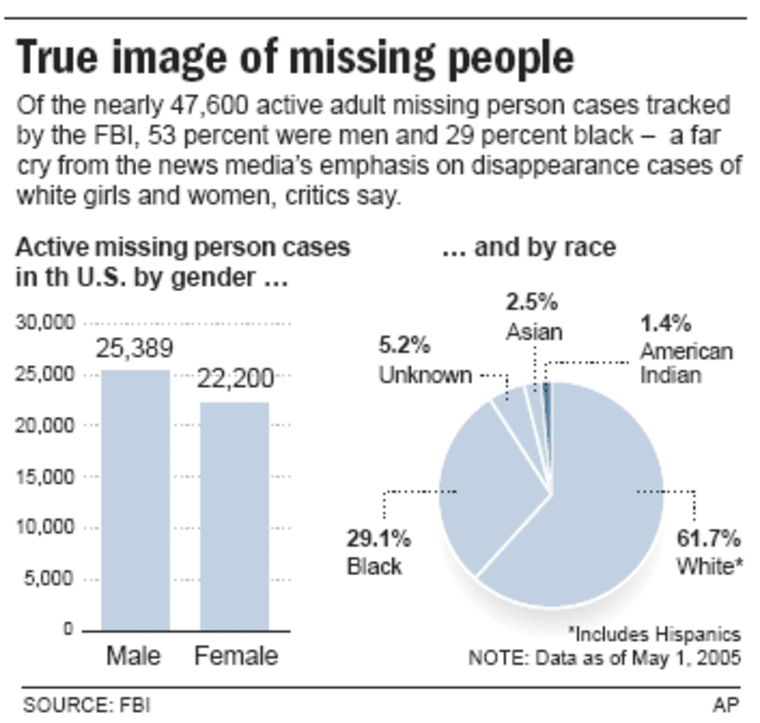Missing American girls are often the lead story: The networks and the cable news channels can't seem to get enough of Laci, of Chandra, of Lori, of Jennifer, of Elizabeth, of Natalee.
Their disappearances have brought heartbreak and anguish to their families. But if all you did was watch the TV news in this country, you might think that these are the only people who are missing — or that their fate in particular is incredibly important. News channels tell the story of their disappearances not once, but again and again.
But in a country of almost 300 million, many other Americans are missing too.
Tamika Huston, bright and beautiful with an angel's voice, is one of the other missing Americans.
Tamika Huston's untold story
Aunt Rebkah Howard calls Huston "an amazing young woman."
"She's very bubbly, very bright," says Howard. "She has an amazing singing voice."
Huston's dream of becoming a singer led her to try out for the TV show "American Idol." She didn't make the cut, but the experience seemed to inspire her to set her sights beyond the life she was living in Spartanburg, South Carolina.
"I think she really realized, 'It's time for me to like figure out what I really want to do with the rest of my life,'" says her aunt.
And then, one day in late May of 2004, Huston vanishes. At 24, Huston had quit her waitressing job and was going out on interviews.Since she was living alone, it took a couple of weeks for her family to notice they hadn't heard from her in awhile.
"I spent Saturday and Sunday trying to find her," says Howard. By Monday morning, Howard called police in Spartanburg and told them something was terribly wrong.
Dog left alone
Police went to Tamika's home. She wasn't there and there was no sign of a struggle. And yet, what police did find was reason for her family to worry even more: Huston's abandoned dog.
"Her dog, Macy, who Tamika treated like her child, was there and had given birth to a litter of puppies," says Howard. "It had obviously been left alone for some time in distress. So, at that point, I knew, without question, that something had gone horribly wrong," says Howard.
And the police report got worse. Inside Tamika's home, police found her driver's license, her cell phone, and some uncashed paychecks. It didn't appear that Huston had just gone on vacation.
Six days later, officers found Huston's car on the other side of town. Inside the car, they found a set of keys that led them to apartments that seemingly had no connection to the missing woman.
Spartanburg Police Lieutenant Steve Lamb, who led the investigation, says he walked around that apartment complex asking if anybody had seen Huston.
Police were at work and so was Rebkah Howard, a public-relations executive in Miami.
PR blitz in Spartanburg
Howard did what she does best: She drafted press releases and started making phone calls.
In Spartanburg, her public relations skills paid off. The local media picked up on Tamika's story pretty quickly.
But Howard knew she had to spread the word outside Spartanburg. "Tamika could be anywhere from California to New York," she says. "I had no idea, so I wanted to cast as wide a net as I could possibly cast."
Broadcast networks initially don't respond
So Howard starting calling the broadcast networks. But nothing happened. "I couldn't understand why I wasn't even getting, you know, 'Thank you very much, but we're not interested in this story at this time,'" says Howard.
Howard says no one responded: Not at NBC, ABC, CBS, CNN, Fox, or MSNBC.
It was crushing news for Howard. Her family had done everything they could think of from prayer vigils and a $30,000 reward to Web sites devoted to news about Huston. And this was a family with some connections — an uncle works for U.S. Senator Patrick Leahy, while Howard’s husband is former NFL star Desmond Howard (a Heisman trophy winner and later Super Bowl MVP).
But those connections didn't help enough and this family found the disinterest in Tamika's story frustrating. To them, Tamika's story was so similar to those of other women like Chandra Levy and Lori Hacking.
"Lori Hacking went missing about three weeks after my niece did and her family was getting round-the-clock coverage on that case," recalls Howard. "And I had just spent the preceding three weeks trying to get the attention of those same reporters, of those same programs, of those same networks, to pay attention to what I was saying about Tamika. I was flabbergasted."
Not taking ‘no’ for an answer
But Howard wouldn't take no for an answer: Seeing the steady drumbeat of the Laci Peterson coverage, she says she called the "Today" show directly and got nowhere. The same was true at "Good Morning America," at the "Early Show" on CBS, at "20/20" and "Dateline."
"I never got past — I was directed to send an e-mail, which I did," says Howard. But nobody ever messaged her back.
No one is claiming that every missing-persons story should get a place on the news — there are almost 50,000 people in the FBI's database of missing persons cases. But consider this: most of those missing adults are men. Almost 30 percent of those abducted or kidnapped are black.

So why is it that we in the news media, seem to focus so much on stories that involve victims who are young, attractive, female, and white?
"Tamika's young, she's attractive, middle class," says her aunt. "The only thing that she's isn't is white. You know, I don't know what else it could be."
Before one can dismiss that criticism, there are numbers gathered by media analystAndrew Tyndall, who regularly monitors network news: In the year Tamika's relatives were begging for airtime, the morning news broadcasts on NBC, ABC, and CBS aired a combined 941 minutes on the Laci Peterson story, 135 minutes about Lori Hacking (killed by her husband in Salt Lake City), and 98 minutes of coverage on Audrey Seiler (a University of Wisconsin student who faked her own abduction).
There was even more coverage on cable. At "Dateline," we did almost six hours just on the Laci Peterson story.
For this story, "Dateline" contacted the presidents of all three network news divisions, as well as the heads of the cable-news channels. Only one of them agreed to sit down for an interview: NBC News President Neal Shapiro (MSNBC.com is a joint venture between Microsoft and NBC).
Josh Mankiewicz: Why is there such a huge disparity in stories about white victims as opposed to all other kinds?Neal Shapiro, NBC News president: Well let me say, I don't like hearing that that's true. Our mission is to try to cover America. And that means all facets of America. And when our coverage doesn't reflect that, it distresses me. That said, I think it's important that people in the industry talk about it. I think the fact that I'm talking about it, I think the fact that "Dateline NBC" is devoting airtime to it, means we take it seriously. And we have to do better.
Shapiro says the wall-to-wall coverage often starts not with the networks, but with cable, which has 24 hours to fill each day and can follow a developing story in an effort to hold an audience.
But that doesn't explain all those network hours devoted to stories like Laci Peterson.
Mankiewicz: I can only conclude that the reason we do those kinds of stories again and again and again is because they work with the audience. Because they get a rating.Shapiro: I think we do stories that people care about. And there's no doubt that when a story gets, has, and reaches such talkability that everybody's talking about, that it's on Talk Radio, that it's on cable — that if we as a network news division feel like we can weigh in, we can advance the story — we should. I think we shouldn't be above the news.
Shapiro says that in NBC, there are no rules, written or unwritten, about who should or shouldn't be covered.
Shapiro: I think when the Peterson story first started, I remember hearing it on the radio. And I had no idea who the Petersons were or what they looked like. So I think, certainly, when we start to chase stories, I'm not sure we even know.Mankiewicz: But is the fact that the victim in those cases turned out to be an attractive white woman — is that why we covered it so many times and devoted so much air time to it?Shapiro: I hope not. And I don't think so. Mankiewicz: To what extent is the race of the people involved a factor in making editorial decisions?Shapiro: Let me make this clear. Race is not a factor in who we cover or how we cover it.
Not everyone is convinced.
"If you're covering the nation, cover the entire nation. If you're covering the American people, cover all the people," says Deborah Mathis, a newspaper columnist who also teaches journalism at Northwestern University.
"I'm not accusing news executives of racism, not per se. I am accusing them of ignorance," says Mathis, a former anchor, reporter, producer, and newsroom manager.
Finally, getting some attention
Months after Huston vanished, Howard finally made some headway. Tamika Huston's story got a 15-second mention on Fox news channel, "America's Most Wanted" aired a show about the case, and "Headline News" also did the story.
Meanwhile, police have made progress. Through a key found in Tamika's car, they discovered what might be a crime scene in a nearby apartment. Blood evidence on acarpet matched Tamika's DNA. And police now have a suspect, but no proof whether or not Tamika is dead or alive.
After "Dateline" interviewed Howard, USA Today picked up the story. And recently, news programs have been discussing not the story of Tamika, but why the story of her disappearance received so little attention.
Broadcast networks and cable news channels did give more coverage than usual to the story of three missing Hispanic boys in Camden, N.J.
And in the midst of the Natalee Holloway coverage, some national attention was given to the story of Latoyia Figueroa, a 24-year-old pregnant mother of one, who has been missing from Philadelphia since July 18.
Despite the best efforts of her family, Tamika Huston is still missing from her home and from the lives of her relatives. She's missing from those hours of network and cable news coverage as well.
But she is finally in the headlines — ironically, as a symbol of how missing Americans who look like her are almost never on the nation's electronic front page.
